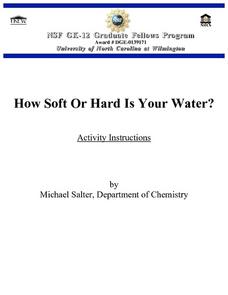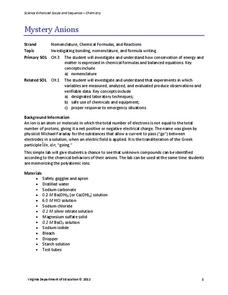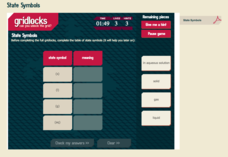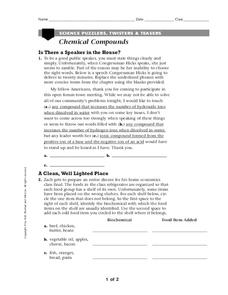Curated OER
How Soft or Hard is Your Water?
Students test samples of water to determine how a chemical water softener affects water's ability to form suds. After collecting their data and analyzing their results, students answer follow-up questions about their lab.
Curated OER
Ions in the Environment
Students explain the importance of the five main biogeochemical cycles. In this chemistry lesson plan, students discuss how ions are transported in the environment. They design an experiment to collect data on eutrophication.
Curated OER
Redox Titration Problems Involving Manganate
In this titration worksheet, students determine the number of moles of an ion present in given solutions. Students calculate the relative formula mass and the concentrations of ions for solutions. This worksheet has 7 problems to solve.
Curated OER
Find the Percent of Iron in Manganate (VII)
Dilute sulphuric acid is used to oxidize manganate (VII) into manganese (II) and water. Step-by-step procedures are outlined on the worksheet as well as calculations for junior chemists to perform in their science journals. This...
Curated OER
The Nature of Chemical Change: Acting Out an Example
Students identify the signs that a chemical reaction took place. In this chemistry lesson, students role play the movement of different molecules of matter. They classify matter according to their properties.
Curated OER
The Effect of Concentration Changes on Equilibrium
In this concentration changes and equilibrium worksheet, students experiment with iron (III) ions and thiocyanate ions to observe the effects of concentration on the equilibrium of solutions. Students make observations of their mixtures,...
Curated OER
Rusting-A Form of Oxidation
Young scholars conduct an experiment to observe oxidation. In this chemistry lesson, students explain how rusting happens. They rank metals according to their conductivity.
Curated OER
Balancing Redox Reactions
In this redox reaction worksheet, students perform a redox titration in order to determine the number of iodide ions which react with each mole of iodate (V) ions in a solution. Students calculate their answer using a given equation to...
Curated OER
Hard Water
For this water worksheet, students read how hard water is created and what can be done to soften the water. Then students complete 6 short answer questions.
Curated OER
Ionic and Covalent Bonds
Ionic and covalent bonds are the focus of this chemistry activity, which provides learners with eighteen key terms to use in a fill-in-the-blank activity. Additionally, students are prompted to write the number of atoms in four given...
Curated OER
Chemistry
In this chemistry worksheet, students describe an atom, its parts, the charges of these parts, and atoms life functions. Then they explain what the octet rule states for the placements of electrons around the nucleus of an atom. Students...
Curated OER
Chemistry Lab: Solubility Product Constant of Sodium Chloride
In this solubility product constant of sodium chloride worksheet, learners gather the equipment needed and follow the procedures to determine the solubility product constant of a solute and demonstrate precipitation of a common ion to a...
Curated OER
The Chemistry of Life
In this chemistry of life activity, students will review key terms of plant cell structure and chemistry by reading 13 clues to complete the puzzle. Word bank is included.
Curated OER
Chemistry 1A Review
In this Chemistry 1A worksheet, students review, molecular weight, solubility, endothermic reactions, and number of protons, neutrons, and electrons for elements. Students review Lewis Structures and how to predict the amount of product...
Curated OER
A Test-Tube Study of Redox Reactions
Six different redox reactions are set up in the lab by your chemistry class. Inquisitors methodically test each one and eventually order them according to oxidizing strength. This is a neat way to have the learners perform more than one...
Virginia Department of Education
Mystery Anions
Lost an electron? You should keep an ion them. Young chemists learn qualitative analysis in the second activity of an 11-part chemistry series. After observing reactions of simple salts, the teacher provides pupils with unknown samples...
Pingry School
Solubility Product of an Ionic Compound
How do scientists determine when a solution is fully saturated? Scholars address the topic as they observe patterns of precipitation in various concentrations of ions. Using a well plate, pipette, and common chemicals, they collect data...
Curated OER
Strong Acids and Bases
A straight-forward exercise awaits your chemistry charges. Two pages provide plenty of room for them to calculate the pH of five solutions, determine the number of hydrogen and hydroxide ions, and solve problems dealing with solutions....
Science Geek
pH Calculations
Performing calculations is for more than just mathematicians — it's an important science skill, too. Demonstrate the pH calculations using the slide show resource. The final resource of a seven-part unit introduces young scientists to...
Royal Society of Chemistry
State Symbols
When water is a solvent in a chemical equation, we consider it an aqueous solution. Scholars match the name of four states of matter to their proper symbol in a chemical equation. Four puzzles provide repetition to help pupils remember...
Curated OER
Interpreting pH
In this pH worksheet, students read about pH and the concentration of ions in solutions that are acidic and basic. They answer four questions about pH and determine the concentration of hydronium ions and the pH given concentrations of...
Curated OER
Chemical Compounds
In this chemistry worksheet, students identify 3 different chemical compounds, 3 identify biochemical products, 4 identify terms, and 2 identify atomic symbols.
Curated OER
The Halogens
In this chemistry activity, students answer 24 questions related to properties of halogens. They fill in the table with the correct answers and participate in teacher demo.
Curated OER
Construction of a Microscale Fuel Cell
Fuel cells are being called the "energy source" of the future. Allow your high school chemistry class to construct a miscroscale fuel cell, complete with all components to generate energy. This engaging activity will allow them to apply...

























